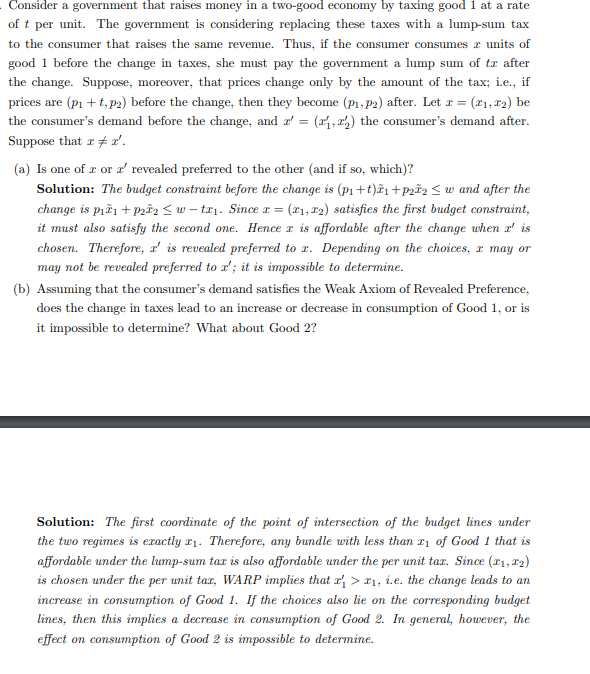Consider a government that raises money in a two-good economy by taxing good 1 at a rate of t per unit. The government is considering replacing these taxes with a lump-sum tax to the consumer that raises the same revenue. Thus, if the consumer consumes 2 units of good 1 before the change in taxes, she must pay the government a lump sum of te after the change. Suppose, moreover, that prices change only by the amount of the tax; i.e., if prices are (p₁+t, p2) before the change, then they become (p₁, p2) after. Let x = (1, ₂) be the consumer's demand before the change, and z' = (₁, ₂) the consumer's demand after. Suppose that x = x¹. (a) Is one of r or a' revealed preferred to the other (and if so, which)? Solution: The budget constraint before the change is (p₁+t)ã1+prỡ2 ≤ w and after the change is piã₁ + P2Ã2 ≤ w− tx₁. Since x = = (1, 2) satisfies the first budget constraint,
Consider a government that raises money in a two-good economy by taxing good 1 at a rate of t per unit. The government is considering replacing these taxes with a lump-sum tax to the consumer that raises the same revenue. Thus, if the consumer consumes 2 units of good 1 before the change in taxes, she must pay the government a lump sum of te after the change. Suppose, moreover, that prices change only by the amount of the tax; i.e., if prices are (p₁+t, p2) before the change, then they become (p₁, p2) after. Let x = (1, ₂) be the consumer's demand before the change, and z' = (₁, ₂) the consumer's demand after. Suppose that x = x¹. (a) Is one of r or a' revealed preferred to the other (and if so, which)? Solution: The budget constraint before the change is (p₁+t)ã1+prỡ2 ≤ w and after the change is piã₁ + P2Ã2 ≤ w− tx₁. Since x = = (1, 2) satisfies the first budget constraint,
Principles of Economics, 7th Edition (MindTap Course List)
7th Edition
ISBN:9781285165875
Author:N. Gregory Mankiw
Publisher:N. Gregory Mankiw
Chapter6: Supply, Demand And Government Policies
Section: Chapter Questions
Problem 5QR
Related questions
Question
please teach explain step by step

Transcribed Image Text:Consider a government that raises money in a two-good economy by taxing good 1 at a rate
of t per unit. The government is considering replacing these taxes with a lump-sum tax
to the consumer that raises the same revenue. Thus, if the consumer consumes a units of
good 1 before the change in taxes, she must pay the government a lump sum of te after
the change. Suppose, moreover, that prices change only by the amount of the tax; i.e., if
prices are (p₁ +t, p2) before the change, then they become (p₁, p2) after. Let z = = (1, ₂) be
the consumer's demand before the change, and r' = (₁, 2) the consumer's demand after.
Suppose that xx¹.
(a) Is one of r or a' revealed preferred to the other (and if so, which)?
Solution: The budget constraint before the change is (p₁+t)ã₁+p22 ≤ w and after the
change is p₁₁+p2₂Ã2 ≤ w− tx₁. Since x = (x1,x2) satisfies the first budget constraint,
it must also satisfy the second one. Hence r is affordable after the change when x' is
chosen. Therefore, r' is revealed preferred to 2. Depending on the choices, x may or
may not be revealed preferred to r'; it is impossible to determine.
(b) Assuming that the consumer's demand satisfies the Weak Axiom of Revealed Preference,
does the change in taxes lead to an increase or decrease in consumption of Good 1, or is
it impossible to determine? What about Good 2?
Solution: The first coordinate of the point of intersection of the budget lines under
the two regimes is exactly r₁. Therefore, any bundle with less than ₁ of Good 1 that is
affordable under the lump-sum tar is also affordable under the per unit tax. Since (x1, x₂)
is chosen under the per unit tax, WARP implies that r₁ > x₁, i.e. the change leads to an
increase in consumption of Good 1. If the choices also lie on the corresponding budget
lines, then this implies a decrease in consumption of Good 2. In general, however, the
effect on consumption of Good 2 is impossible to determine.
Expert Solution
This question has been solved!
Explore an expertly crafted, step-by-step solution for a thorough understanding of key concepts.
Step by step
Solved in 3 steps with 1 images

Knowledge Booster
Learn more about
Need a deep-dive on the concept behind this application? Look no further. Learn more about this topic, economics and related others by exploring similar questions and additional content below.Recommended textbooks for you

Principles of Economics, 7th Edition (MindTap Cou…
Economics
ISBN:
9781285165875
Author:
N. Gregory Mankiw
Publisher:
Cengage Learning

Principles of Macroeconomics (MindTap Course List)
Economics
ISBN:
9781285165912
Author:
N. Gregory Mankiw
Publisher:
Cengage Learning

Essentials of Economics (MindTap Course List)
Economics
ISBN:
9781337091992
Author:
N. Gregory Mankiw
Publisher:
Cengage Learning

Principles of Economics, 7th Edition (MindTap Cou…
Economics
ISBN:
9781285165875
Author:
N. Gregory Mankiw
Publisher:
Cengage Learning

Principles of Macroeconomics (MindTap Course List)
Economics
ISBN:
9781285165912
Author:
N. Gregory Mankiw
Publisher:
Cengage Learning

Essentials of Economics (MindTap Course List)
Economics
ISBN:
9781337091992
Author:
N. Gregory Mankiw
Publisher:
Cengage Learning

Principles of Economics (MindTap Course List)
Economics
ISBN:
9781305585126
Author:
N. Gregory Mankiw
Publisher:
Cengage Learning
